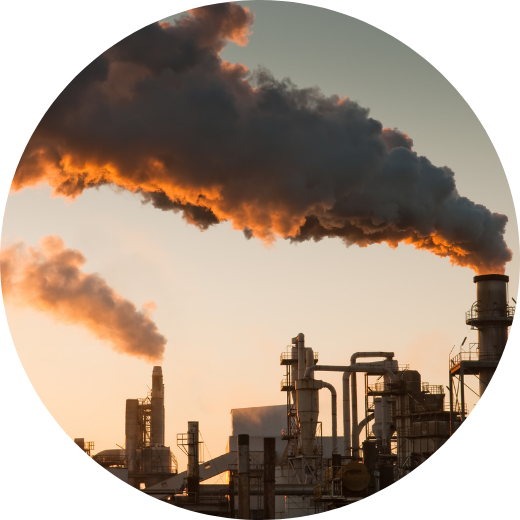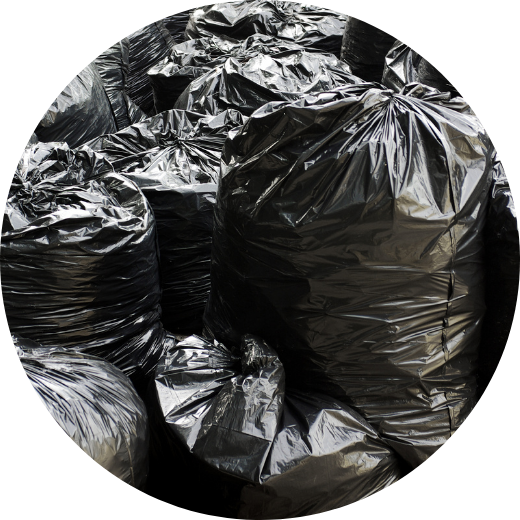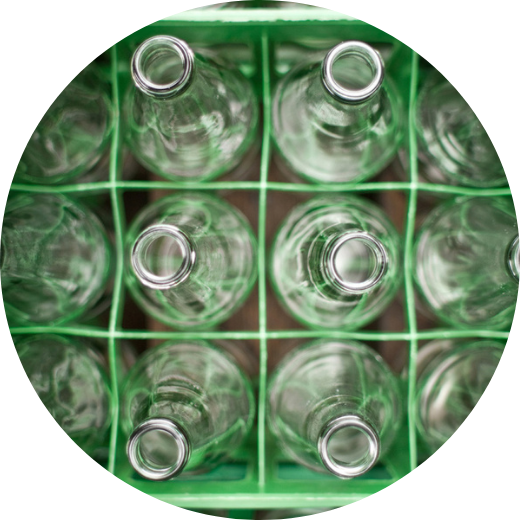Trash is toxic, and it impacts everything.
The United States has an overproduction problem, and it’s destroying our environment and threatening our health. Companies constantly pump out tons of products and packaging, most of which is made from single-use plastics. All this junk eventually ends up as trash. Today, the bulk of our country’s waste facilities – and the companies that run them – go unchecked. Weak laws and regulations around landfills and incinerators allow these facilities to keep polluting, largely without consequence. As we continue to rely on old, outdated waste technology – and as powerful corporations spend big money to maintain the status quo – the problem only gets worse.
Areas of Impact
20% of global methane emissions come from the waste industry.
Climate change poses an existential threat to the Earth. As the planet continues to warm, we increasingly face a dystopian future: Higher sea levels, intense flooding, prolonged droughts and wildfires, excessive heatwaves, and more intense storms. Addressing climate change means cutting emissions across the board – including in the waste sector.
The entire lifecycle of goods – from the extraction of raw materials to the disposal of goods – drives greenhouse gas emissions and environmental degradation. Production not only exploits natural resources, but also contaminates the air, soil, and water with toxic chemicals. The production of goods – especially single-use plastics – requires enormous amounts of energy, much of it from fossil fuels. In fact, nearly all plastic is made from oil and gas, and the plastic industry’s climate pollution is on track to surpass emissions from coal-fired power plants.
Disposing of trash also leaves its mark on the planet. Organic materials like food and paper release methane – a powerful climate pollutant – when they decompose in landfills. In fact, landfills are the third-largest source of methane emissions globally. Burning waste isn’t any better. It emits toxic and dangerous air pollutants and damages our climate. Even when waste is burned to create electricity, it releases more emissions than it replaces.
But it doesn’t have to be this way. According to the EPA, 42% of U.S. greenhouse gas emissions are linked to the production, use, and disposal of goods. That means Zero Waste solutions – like reuse, composting, and real recycling – aren’t just about reducing waste. They’re powerful climate strategies. Abandoning single-use packaging and replacing it with reusable and refillable models can cut greenhouse gas emissions associated with producing and packaging goods by up to 85%
That’s why Just Zero partners with communities across the country to shut down polluting landfills and incinerators, phase out single-use plastics and packaging, and build local systems that keep resources in use and out of the trash. Together, we’re proving that Zero Waste is climate action.
Zero Waste systems create more than 200 times as many jobs as landfills and incinerators.
The toxic, unsustainable ways we produce, consume, and dispose of waste don’t just threaten our health and environment – they also damage our economy. Our current system is designed around a single-use, take-make-waste model that centralizes wealth in the hands of consumer brands and corporate giants while limiting economic opportunity for local communities and small businesses. The few jobs that landfills and incinerators provide are not only scarce – they’re some of the most dangerous in the country. According to the U.S. Bureau of Labor Statistics, waste disposal workers face nearly twice the injury and illness rates than workers in any other sector. If that weren’t bad enough, waste management jobs are the fourth deadliest jobs in the country.
Zero Waste offers a smarter, safer, and more equitable path forward. Studies consistently show that Zero Waste strategies – like reuse, repair, composting, and recycling – create far more jobs than landfilling or incineration. Recycling alone creates 10 times more jobs per ton of waste than disposal. Composting supports twice as many jobs per ton as burning or burying trash. And Reuse creates as many as 30 times more jobs than landfills.
But Zero Waste doesn’t just create more jobs – it creates better jobs. These roles often require a wider range of skills, pay higher wages, and offer more stable employment. Many jobs in reuse, repair, and recycling also support small businesses and local entrepreneurs, helping to diversify and decentralize local economies.
Even better, Zero Waste systems strengthen communities by keeping materials – and dollars – circulating within the region. Instead of extracting resources and shipping waste across the country, Zero Waste builds local economies and resilience by turning what we discard into resources for new economic activity.
That’s why Just Zero partners with communities across the country to phase out polluting waste practices and build smart, effective Zero Waste systems in their place. We support local leaders in advancing policies and programs that prioritize reuse, repair, composting, and recycling – creating safer jobs and stronger local economies. Because we know that a Zero Waste future isn’t just better for the planet – it’s better for people, too.
79% of U.S. trash incinerators are in or near communities of color or low-income communities.
Many waste facilities – like landfills and incinerators – are forced into communities of color, low-income communities, and those with limited English-speaking proficiency. This isn’t a new development. The United States has a long history of systemic racism, classism, white supremacy, and other forms of injustice.
As waste generation increased in the 1970s and 1980s, the waste disposal industry boomed. Profit-driven companies knew white communities would not accept these facilities – so they targeted and took advantage of historically marginalized communities instead.
No community should be a sacrifice zone because of an age-old belief that trash “has to go somewhere.” And it is not enough to simply shut down dangerous waste facilities. We need stronger, healthier, more sustainable solutions in their place. Otherwise, the waste industry will continue to force new landfills and incinerators into already burdened communities.
That’s where Zero Waste comes in. Just Zero works in partnership with communities on the frontline to shut down polluting landfills and incinerators – and replace them with real, effective Zero Waste solutions. We support local campaigns and policy changes that center reuse, composting, and recycling systems. By advancing these solutions, we can keep resources in circulation and pollution out of communities – proving that toxic facilities aren’t necessary at all.
Zero Waste systems challenge the false narrative that landfills, incinerators, and other polluting waste practices are unavoidable. They prove what’s possible – and help make dirty, outdated waste practices a relic of the past.
76 million people in the U.S. live within three miles of a landfill or incinerator.
Burning and burying trash is a dangerous business. Our trash (especially plastic) is full of harmful toxics including hydrogen sulfide, benzene, vinyl chlorides, lead, mercury, PCBs, and PFAS (“forever chemicals”). Traditional methods of managing all this waste poison the air we breathe, the water we drink, and the soil we rely on. When we inhale, ingest, and absorb these toxic chemicals, they can cause devastating health impacts like lung, heart, and neurological damage. Many are also known to cause cancer.
Much of this waste is not just dangerous when we dispose of it. They’re hazardous from the moment they’re made. Most plastics are produced in petrochemical facilities located near low-income communities and communities of color. Local residents face heightened risks of asthma, cancer, and other chronic health problems due to air and water pollution. These facilities release harmful chemicals like benzene, vinyl chloride, and other known carcinogens into the environment long before a plastic product is ever used, let alone thrown away.
Public health deserves a better approach. The answer: Zero Waste. When we refuse to treat waste as inevitable, we can develop systems that prioritize health over corporate profits. Just Zero works to eliminate needless waste, phase-out single-use plastics, and implement programs that recycle as much material as possible.
Why? Because this work helps make the landfills and incinerators threatening our air, water, and health a thing of the past. And when it comes to toxic chemicals, we’re working to force big brands to redesign their products and packaging to eliminate harmful additives that leach into our food, drinks, and cosmetics.
Zero Waste solutions can transform the Earth.
With just, equitable Zero Waste solutions, more people will have access to clean air, fresh water, green jobs, and healthier communities. To put an end to this crisis, we need a holistic approach. One that not only shuts down dangerous waste facilities, but also advances policy solutions that stop waste before it starts. Just Zero is the only national nonprofit addressing the entire waste spectrum. Together, our four projects tackle the full scope of problems created by how we produce and manage waste – while advancing interconnected solutions that protect people and the planet.
Corporate Pollution
We work with environmental groups and organizations to design and advocate for policies that hold corporations responsible for toxic production practices and the waste they create.
Healthy Environments
We partner with residents and grassroots leaders to stop the expansion of harmful disposal facilities and polluting waste practices, and we push for healthier, safer alternatives.
Preventable Waste
We work alongside communities, advocates, and lawmakers to phase out unnecessary and harmful waste –from single-use plastics and excessive packaging to avoidable food waste.
Zero Waste Systems
We champion local and state efforts to build effective waste reduction systems, including composting infrastructure, reuse networks, and deposit-return programs.



